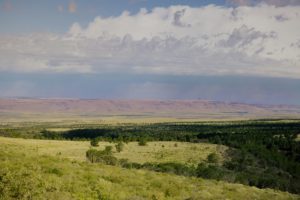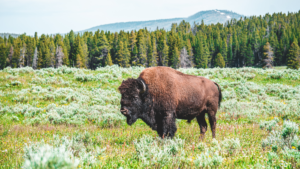For immediate release: October 3, 2024
Media contacts:
Greta Anderson, Western Watersheds Project (520) 623-1878; greta@westernwatersheds.org
Regan Downey, Wolf Conservation Center (914)763-2373; regan@nywolf.org
Claire Musser, Grand Canyon Wolf Recovery Project (928) 202-1325; claire@gcwolfrecovery.org
Sandy Bahr, Sierra Club – Grand Canyon Chapter, (602) 999-5790, sandy.bahr@sierraclub.org
FLAGSTAFF, Ariz. – The Arizona Game and Fish Department and the U.S. Fish and Wildlife Service are currently trapping and planning to remove the Kendrick Peak family of wolves who have been living in the wilds west of Flagstaff since at least June of this year. The wolves, two of whom have been named “Hope” and “Mystery,” have become locally-celebrated with many Flagstaff residents welcoming their return to these lands.
“It’s disappointing that the agencies insist on enforcing the arbitrary and unscientific boundaries of the recovery area, when the very presence of these wolves in the Grand Canyon ecoregion demonstrates what real recovery must look like: broad geographic distribution of wolves throughout the southwest,” said Greta Anderson, deputy director of Western Watersheds Project. “Nature abhors bureaucracy.”
The Kendrick Peak wolf family has broad support in the Flagstaff community, including from scientists, Flagstaff’s Mayor, and from Flagstaff’s City Council which in 2021 passed a resolution in support of the Endangered Species Act and Mexican gray wolves. In August of this year, wolf supporters held a rally in Flagstaff asking the Arizona Game and Fish Commission to let this wolf family stay near Kendrick Peak and north of the arbitrary Interstate 40 boundary. Scientists have concluded that establishing a population of wolves in the Grand Canyon region of northern Arizona is necessary for Mexican gray wolf recovery as part of the larger recovery efforts throughout the Southwest. Dozens of Arizonans also reached out to the management agencies requesting that the Kendrick Peak family be left alone.
“Hope and Mystery are sentient individual beings with their own lives to lead. They have chosen Kendrick Peak as their home, and it’s time we listen to them as they tell us what they need,” said Claire Musser, executive director of the Grand Canyon Wolf Recovery Project. “We need to embrace this opportunity, let our wolves lead the way, and allow them to become active participants in their recovery—not risk their lives simply because they don’t conform to our predetermined human rules.”
“It’s outrageous that Arizona’s moving forward with a dangerous plan to capture and relocate the Kendrick Peak pack,” said Collette Adkins, carnivore conservation program director at the Center for Biological Diversity. “Wolves like Hope could thrive in this wild landscape if we let them. Their return to the Grand Canyon region should be met with celebration, not traps.”
“We should be thanking these wolves for establishing a territory in ideal lobo habitat. They’re reminding us that if we just let wolves be wolves, a healthier and more widespread population of Mexican gray wolves is on the horizon,” said Regan Downey, director of education at the Wolf Conservation Center.
“Mexican gray wolves belong in the Grand Canyon region – they, scientists, and conservationists agree on that – and wolves are a critical component to ensuring healthy ecosystems in the region,” said Sandy Bahr, director for Sierra Club’s Grand Canyon Chapter. “The Kendrick Peak pack is doing its part and has been welcomed by the Flagstaff community. Game and Fish should do its part, do its job, and let them be!”
Mexican gray wolves are protected under the Endangered Species Act. Killing a Mexican wolf is a violation of the Federal Endangered Species Act and can result in criminal penalties of up to $50,000, and/or up to one year in jail, plus a potential civil penalty of up to $25,000. Individuals with information they believe may be helpful are urged to call one of the following agencies: USFWS special agents in Pinetop, Arizona, at (346) 254-0515; the WMAT at (928) 338-1023 or (928) 338-4385; AZGFD Operation Game Thief at (800) 352-0700; or NMDGF Operation Game Thief at (800) 432-4263. There is a $105,000 reward fund for information about illegal killings of Mexican gray wolves.
###






